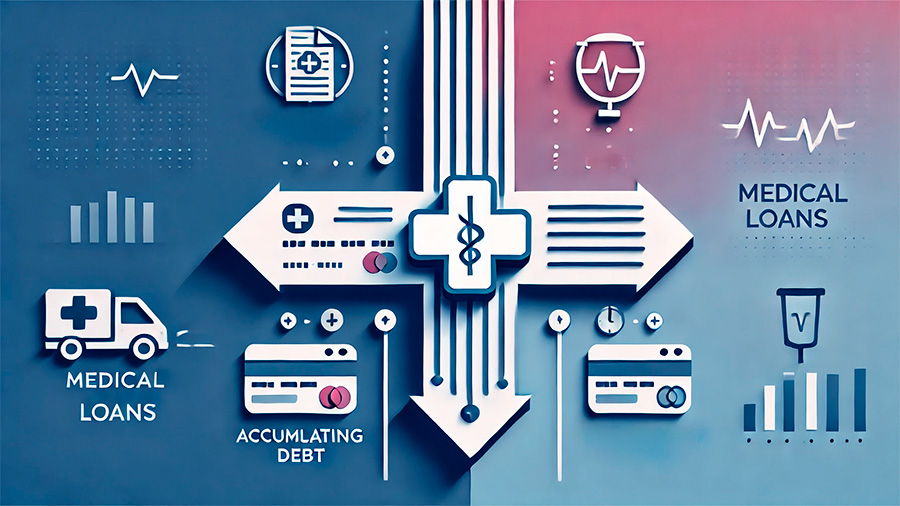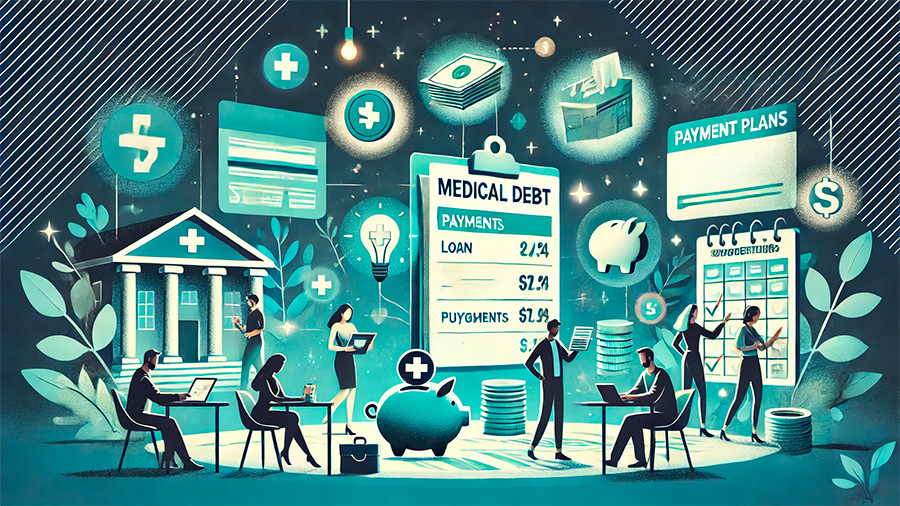From Treatment to Debt: The Impact of Medical Loans on Financial Stability

Medical expenses are a leading cause of financial strain for many individuals, particularly in cases of unexpected illness, emergency procedures, or treatments not covered by insurance. In such scenarios, medical loans can provide the necessary funds to cover immediate healthcare costs. However, while medical loans offer short-term relief, they can also lead to long-term financial challenges if not managed properly. This article explores the impact of medical loans on patients’ financial health, including both the potential benefits and risks, and offers strategies for managing debt responsibly.
Understanding Medical Loans
Medical loans are a form of personal loan specifically designed to help cover the costs of healthcare treatments, from elective surgeries to emergency care and dental work. These loans are typically unsecured, meaning they do not require collateral, and may have either fixed or variable interest rates. While medical loans provide immediate access to funds, they also come with the obligation to repay the borrowed amount, often with interest.
1. How Medical Loans Work
Medical loans function similarly to other personal loans but are specifically intended to cover healthcare-related expenses. They can help cover the cost of procedures, hospital bills, medications, and even post-surgery rehabilitation. Most medical loans offer flexible terms, including repayment schedules that can last from a few months to several years. Some loans also offer promotional periods with low or zero interest rates for the first few months.
Key features of medical loans:
- Unsecured loans: Medical loans are often unsecured, meaning no collateral is required, making them accessible for individuals without significant assets.
- Fixed or variable interest rates: Interest rates on medical loans can be fixed or variable, with rates typically based on creditworthiness.
- Flexible repayment options: Depending on the loan, repayment periods can vary, allowing borrowers to choose a plan that fits their financial situation.
2. Benefits of Medical Loans
Medical loans offer several advantages for patients needing financial assistance for healthcare. For many, these loans can be a lifeline in times of need, providing a means to access necessary care without having to wait or delay treatment.
How medical loans benefit patients:
- Immediate access to funds: Medical loans provide quick access to necessary funds, allowing patients to proceed with urgent treatments without delay.
- Payment flexibility: These loans often come with flexible repayment terms, which can help patients manage the financial burden over time.
- Coverage for non-insured treatments: Medical loans can cover treatments that may not be fully covered by insurance, such as cosmetic surgeries or fertility treatments.
- Preventing further health deterioration: By securing funding for medical procedures, patients can address health issues promptly, potentially avoiding worsened conditions or long-term complications.

Challenges and Risks of Medical Loans
While medical loans provide immediate relief, they can also introduce financial risks if not managed responsibly. One of the main concerns is the potential for accumulating debt that can be difficult to repay, especially if patients are unable to secure a steady income or if the terms of the loan are too stringent.
1. High-Interest Rates and Fees
Medical loans can come with high-interest rates, especially if the borrower has poor credit. Over time, these interest payments can significantly increase the total cost of the loan, potentially creating a financial burden that stretches for years. In some cases, promotional zero-interest rates can expire, leading to retroactive interest charges that further increase the loan balance.
Potential issues with high-interest loans:
- Increased loan cost: Higher interest rates and fees can substantially increase the total cost of the loan, making it more difficult to pay off.
- Accruing interest on existing balances: If the loan terms are not clear or if patients miss payments, interest can quickly add up, compounding the financial strain.
- Debt accumulation: Borrowers may find themselves taking on additional loans to pay off existing ones, leading to a cycle of debt that can be hard to escape.
2. Impact on Credit Score
Medical loans, like other types of personal loans, can have an impact on a patient’s credit score. Failure to make timely payments or defaulting on the loan can cause significant damage to a borrower’s credit rating, which can make it harder to secure future loans, including mortgages or auto loans. Even a single missed payment can negatively affect credit scores, leading to long-term financial consequences.
How medical loans affect credit scores:
- Missed payments: Late payments or defaults on a medical loan can result in a negative credit report, affecting the patient’s ability to borrow money in the future.
- High credit utilization: If a borrower uses a large percentage of their available credit to pay off medical loans, this can lead to higher credit utilization ratios, which may hurt their credit score.
- Debt collection: If the loan is not repaid, it may be sent to collections, further damaging the borrower’s credit rating.
3. Loan Repayment Struggles
If patients do not have a steady income or face unexpected financial difficulties, repaying a medical loan can become a challenge. High monthly payments may not be sustainable, particularly for individuals with other debts or financial obligations. The pressure of repaying a loan while managing other expenses can create financial stress, especially when the medical costs continue to rise due to long-term treatment or ongoing medical needs.
Challenges in repaying medical loans:
- Financial instability: Unexpected changes in income, such as job loss or reduced working hours, can make it difficult for patients to keep up with loan payments.
- Long-term debt: Some medical loans have long repayment periods, which means borrowers can be stuck with payments for many years, straining their financial resources.
- Multiple loan obligations: Some patients may need to take out additional loans to cover other expenses, increasing the amount of debt they are carrying.

Managing Medical Debt Responsibly
To avoid the financial strain caused by medical loans, patients must adopt responsible borrowing practices. Here are some strategies to help manage medical loans effectively and prevent debt from becoming overwhelming.
1. Carefully Assess Loan Terms Before Borrowing
Before taking out a medical loan, it’s essential to carefully review the loan terms, including interest rates, repayment schedules, and any fees. Understand the full cost of the loan over time and ensure that the repayment terms are manageable. Compare multiple loan offers to find the best deal and avoid loans with excessively high-interest rates.
Things to consider when applying for a medical loan:
- Interest rates: Make sure the interest rates are reasonable and that they fit within your budget for monthly payments.
- Repayment terms: Choose a loan with terms that are realistic for your financial situation, with manageable monthly payments.
- Hidden fees: Be aware of any fees that could be added to the loan balance, such as application fees or late payment penalties.
2. Focus on Repayment Strategies
Once the loan is in place, it’s crucial to have a clear repayment strategy. Set up a budget to prioritize loan payments and ensure that funds are allocated to cover essential expenses first. Automating loan payments can help avoid late fees and missed payments, ensuring that the loan is paid off on time.
Smart repayment strategies:
- Pay off high-interest debt first: If you have multiple loans, prioritize repaying the ones with the highest interest rates to reduce overall debt faster.
- Set up automatic payments: Automating payments helps ensure that the loan is repaid on time, avoiding late fees and negative impacts on your credit score.
- Consider refinancing options: If interest rates change or you encounter financial difficulties, refinancing your loan may help lower your monthly payments or extend the repayment period.
3. Seek Financial Counseling
If you’re struggling with medical debt, seeking financial counseling can provide guidance on how to manage your loans effectively. Financial advisors or credit counselors can help you develop a strategy for debt repayment, negotiate with creditors, or explore other options for managing your medical expenses.
Conclusion
Medical loans provide an important financial tool for individuals facing significant healthcare costs. While they offer much-needed funds in times of need, it is essential to approach medical loans with caution and responsibility. By understanding the loan terms, considering repayment strategies, and seeking professional financial advice, patients can navigate the financial impact of medical loans while maintaining their long-term financial health. With the right planning and approach, medical loans can serve as a helpful tool without jeopardizing financial stability.
